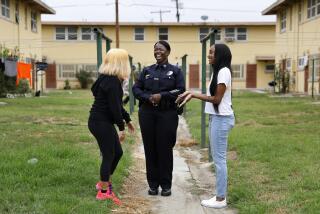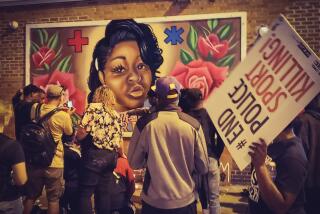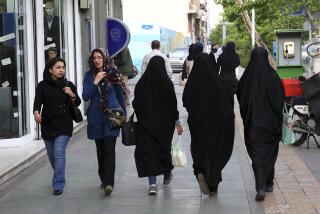Iraq says it rearmed female police
- Share via
BAGHDAD — Iraqi police officials have dropped plans to disarm policewomen and give their guns to male officers after an outcry from critics, who said the move was a sign of religious zealots’ rising influence in Iraq.
Despite the turnabout, which police confirmed Thursday, the U.S. military general who introduced women into the police force said they remained hindered in their attempts to practice real policing skills.
“Even with the revocation order, we will have to watch very closely the actions taken in regards to the remaining female Iraqi police,” said U.S. Army Brig. Gen. David Phillips, adding that there “are numerous ways” to drive women from the force.
That was confirmed by Hanan Jaafer, a policewoman in the Shiite holy city of Najaf who guards the revered shrine of Imam Ali.
Jaafer said none of the roughly two dozen female officers posted at the shrine had guns or uniforms, even though they searched women and children entering the complex and faced threats from the increased use of female suicide bombers. Their male counterparts are armed, Jaafer said.
She said she stopped a woman from entering the shrine last year with explosives that she apparently had swallowed and that had caused her abdomen to swell. Her young son was holding a remote control to detonate them.
“We noticed she had an oddly shaped body,” said Jaafer, who attended the police academy in Baghdad and began her work with the Ministry of Interior, which oversees police, about 18 months ago. “I was warned to check her extra carefully. She felt very hard. We handed her to police and they took her away. They did not even say thank you or praise us with a letter afterward.”
The ministry’s latest decision was made as quietly as the original order to seize the weapons. The ministry announced neither, but critics complained after The Times obtained documents outlining the seizure order and reported on it.
Maysoon Damluji, a female member of parliament, raised the issue with national lawmakers in December, prompting the parliament’s Complaints Committee to seek an explanation.
In a brief response dated Jan. 17, a ministry official said that the order had been “reconsidered” and that the ministry “decided to return all the pistols” to policewomen. A ministry spokesman, Col. Saddoun Abulollah, said that few policewomen had abided by the order in the first place but that all who did had their weapons returned to them. He described their number as “a handful” of the roughly 1,000 women who have qualified as policewomen since U.S. forces introduced female recruitment efforts in late 2003.
The reason for the seizure order remains unclear. The original documents, telling policewomen to turn in their weapons by Dec. 31 or have their pay withheld, said the move was taken after some women quit their jobs and did not turn in their Glock pistols.
It also suggested that the pistols were needed to give to male recruits.
Abulollah said Thursday that the weapons were ordered taken away because some women had given their guns to male relatives.
Samira Musawi, a female parliament member who discussed the matter with the interior minister in December, said she was told the order came after a policewoman went home and found her husband with another woman. The policewoman shot him with her ministry-issued gun, drawing officials to conclude that some women were too volatile to carry arms, said Musawi, who heads the parliament’s Women, Family and Childhood Committee.
Brig. Gen. Phillips, who launched the drive to recruit female officers and who now oversees U.S. efforts to develop the Iraqi police, said in December that he believed the decision was the result of the rising influence of Shiite Muslim conservatives who believe women should not do jobs traditionally held by men.
He denied that the ministry needed weapons for male officers, saying there were more than 8,600 weapons in police storage facilities in December and tens of thousands more en route to Iraq.
“There was and is no shortage of pistols for issue,” Phillips said Thursday in an e-mailed response to questions.
The U.S.-led recruitment effort has been languishing since the United States handed its training program over to Iraqis, Phillips said. He said the number of female recruits had dropped to virtually zero compared with early years in which hundreds of women sought to attend the police academy.
Those who completed the training often complained that they were relegated to desk jobs, Phillips said. “In my two-plus years in Iraq, I have never seen any of the over 1,000-plus female Iraqi police performing law enforcement duty,” he said.
Now, Phillips said, he believes “only a portion” of the original female recruits still are employed by the Interior Ministry.
The ministry said it had no statistics because it did not categorize officers by gender.
Advocates for female officers say Iraq’s growing number of female suicide bombers makes them a necessity. Since November, at least four women have blown themselves up, and police have stopped at least one would-be female suicide bomber before she could detonate her explosives. The military says insurgents are trying to recruit more women because it is easier to get them close to strategic targets.
Jaafer, the Najaf policewoman, said this was why she and her female colleagues needed weapons. “We have been told we must check women in a very accurate way,” she said. “But we have no way to defend ourselves except with our hands. We don’t understand why. We hear there is equality between men and women, so why not for us?”
Also Thursday, a car bomb blew up in northern Baghdad’s Kadhimiya neighborhood, killing at least five people and injuring several, police said.
The explosion took place at a bus terminal on the northern edge of the Shiite district. Police theorized that the bombers planned to attack in the center of Kadhimiya but were deterred by checkpoints, so they left the vehicle at the terminal.
The U.S. military said an American soldier died Thursday in the capital when a roadside bomb exploded. A second soldier was killed by “indirect fire” in another incident outside Baghdad. At least 3,943 U.S. troops have died in the Iraq war since the March 2003 U.S.-led invasion, according to the website icasualties.org.
--
--
Times staff writer Raheem Salman and a special correspondent in Baghdad contributed to this report.
More to Read
Sign up for Essential California
The most important California stories and recommendations in your inbox every morning.
You may occasionally receive promotional content from the Los Angeles Times.













